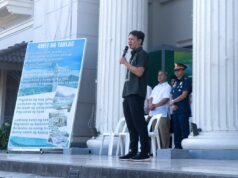ON WEDNESDAY was launched the Sapang Balen Rehabilitation Project of the city government aimed to “promote broader public-private partnership to implement a sustained effort to free the waterway from solid and wastewater pollution.”
I deemed it not only right and proper but even providential that this latest environmental intervention took off from the Holy Rosary Parish Hall. After all, it was here that the Sapang Balen initiative was born. From – of all things – an imprecation. As I wrote here on August 28, 2009:
SUSMARYOSEP, how could so religious a man, a bishop at that, go down to the level of the street punk?
What do you mean, I asked Manang Uriang, our laundrywoman.
There. She pointed to the banner headline of the Punto! I was holding: Bishop: Curse polluters.No, San Fernando Auxiliary Bishop Pablo Virgilio David, better known as Bishop Ambo, did not spew any expletive – no damning hijo de pu__, not even a harmless taksyapo could ever emanate from his holy lips, even as he declared a curse on those who pollute the Sapang Balen creek that runs through the heart of Angeles City.
This is a curse of a kind totally different from your everyday ‘dana or ‘tang ‘na. This one is an execration, a sumpa, righteous one at that coming from a person of moral authority, inflicted upon people in grave error, if not sin. Consequent to this curse is the castigo…not simply de obispo – coming as it does from a bishop, but de dios, the bishop being a man of God.
Says Bishop Ambo in his blog hrp-sac.blogspot.com: “As a Filipino, I believe in sumpa (which) are very much part of Filipino culture and tradition.
Usually pronounced by someone in retribution for an extreme act of disrespect or wrongdoing, a curse is believed to be effective especially when pronounced by a person of authority such as one’s elders or by a priest.”
And “to Kapampangans who are well known for their legendary love and respect for the clergy, being the object of a priest’s sumpa is a fearsome prospect.”
Yes, our old folk still shudder in remembering the sumpa cast by Spanish friars on the pueblo of Masico prior to their execution by the Filipino revolutionaries. Or that cast by a dying priest on Mabalacat.
Bishop Ambo’s curse is totally removed too from the spell, magic or witchcraft that is also attributed to a curse.
Hence, there was no incantation, but matter of fact statements with Bishop Ambo saying: ”Magmula sa araw na ito, binibigyan ko ng sumpa ang Sapang Balen. Sinuman ang lalapastangan nito ay magiging malas sa buhay. (From this day on, I am putting a curse on Sapang Balen. Whoever dares to show disrespect to it will be unlucky in life). This, over a portable sound system as he walked along the banks of the creek, his blog showed.
So how did the people take the bishop’s curse?
“Gasps and whispers from onlookers and passersby” were heard by the bishop, his blog reported. “Then, a handful of residents living near the river joined his group and hastily picked up some trash lying in heaps along the riverbank.”
Posed the blog: “Why would a Bishop go to this extent to help revive a waterway?”
Answered Bishop Ambo: “The river has life and anyone who dumps garbage without compunction is killing it slowly. Laws and ordinances do not seem to work at all; people just ignore these. Let us see how they will react to a curse from a bishop.”
No eternal damnation though is carried in Bishop Ambo’s curse. He himself provided “an easy way out.”
“Kung gusto ninyong pagsisihan ang inyong ginawang paglapastangan, mangumpisal kayo at ang tanging parusang ibibigay ko sa inyo ay magpulot kayo ng dalawang sako ng basura mula sa ilog. (If you want to make amends for the sin you committed, just confess to me. For your penance I will ask you to collect two sacks of trash from the river),” the blog quoted the bishop as saying.
So Bishop Ambo cursed polluters of Sapang Balen creek.
Ah, how the people of Barangays Sta. Cruz and Manibaug-Paralaya in Porac and those of Cutcut in Angeles City could only wish Bishop Ambo would cast a malediction on the piggeries and poultry farms that have long been the very scourge of their existence.
Ah, how they could only wish Bishop Ambo’s curse would provide no way out of eternal perdition for their tormentors.
That is but their just desserts, our beloved Among Ambo.
q q q
AND THEN on October 3, 2011, our front page carried what could have been a follow-up, albeit a distant one, of our column above – Bishop Ambo hails EdPam for Sapang Balen clean-up with the sub-head Curse on polluters of creeks still on
ANGELES CITY – “A dream come true.”
Thus hailed the Most Rev. Pablo Virgilio S. David, auxiliary bishop of San Fernando, of Lingap ku king balen, Malinis a Sapang Balen, the program to clean the city’s principal waterway as well as other creeks and rivers here.
Initiated by Mayor Edgardo Pamintuan, the clean-up drive started last Saturday with scores of students, city employees, civic groups and individual volunteers clearing with their bare hands, rakes, shovels and other implements the Sapang Balen and Abacan creeks of wastes.
It will be undertaken every first Saturday of the month “until the waterways are restored to their pristine nature.”
“When we started cleaning Sapang Balen some years back, we were told by the city government (under then-Mayor Francis Nepomuceno) that they would support us. No, we told them, we are the one’s supporting you,” David recalled in his inspirational message to the group. “Now that has come to pass, the city government of Mayor Pamintuan leading, all of us supporting (the clean-up drive).”
The prelate likewise reminded the people along the riverbanks of the curse he placed on those who would continue to pollute the Sapang Balen creek.
“The river is a creation of God, and like all his creations is good and beautiful. To pollute it is a desecration of God’s work,” David said. “Misumpa la ding magdinat king Sapang Balen (Cursed shall be those who shall dump wastes on the creek).”
The clean-up campaign, David continued, finds greater relevance amid the slew of calamities besieging the country.
“The destructive flooding we are now experiencing is caused, to a great part, by the wastes we throw in rivers, making them constricted,” the bishop said, at the same time warning that there shall come a time when “we cannot anymore dig wells for our water and will have to drink from the rivers, hence the need to clean them.”
The environmental advocacy of David extends to the campaign against polluting piggery and poultry farms in Barangays Sta. Cruz and Manibaug in Porac town and in Barangay Cutcut here.
Last year, David joined a massive march-rally initiated by the Pinoy Gumsiing Ka Movement against the hog farms before the Porac town hall and lashed at the local government unit for reneging on their mandate to serve the well-being of their constituents with the continued operations of the polluting farms…




